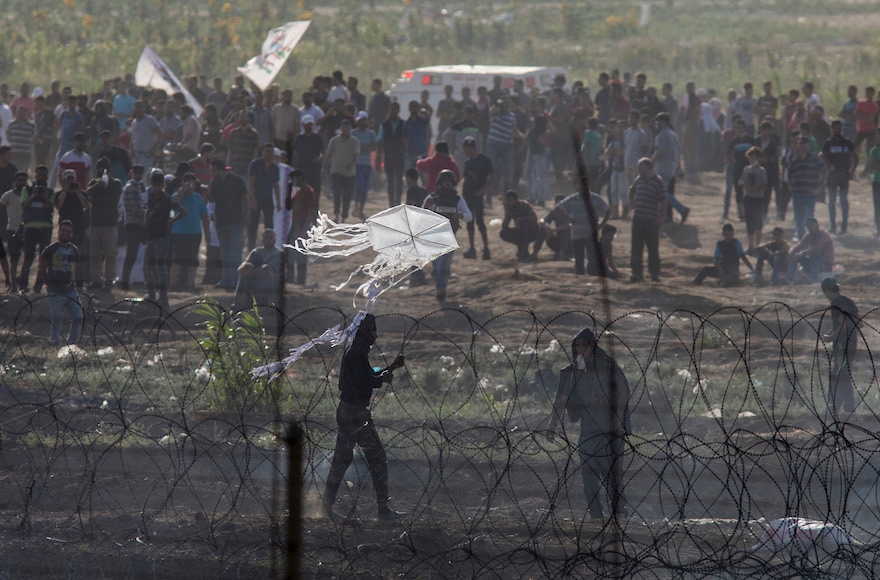Deaths of Palestinian protesters may amount to Israeli war crimes, Human Rights Watch says
Published June 13, 2018

Palestinians protest at the Israel-Gaza border during a long day of clashes with Israeli troops, June 8, 2018. (Ilia Yefimovich/Getty Images)
JERUSALEM (JTA) — Human Rights Watch said the death of Palestinian demonstrators on the Gaza border with Israel at the hand of Israeli soldiers “may amount to war crimes.”
ADVERTISEMENT
Human Rights Watch said in its statement released Wednesday that the demonstrators “posed no imminent threat to life.”
Some 130 Palestinian protesters have been killed since the border protests, dubbed the March of Return, began on March 30, with 61 killed on April 14 in one day of violent protests. (Hamas, the terrorist group that controls the Gaza Strip, acknowledged that most of those killed that day were its members.) Human Rights Watch said it interviewed 10 witnesses to the shootings whose accounts indicated that the Israeli forces shot at protesters who were not a threat to their lives.
The statement was released hours before a United Nations General Assembly emergency meeting on Gaza, where delegates are scheduled to vote on an Arab-backed resolution that condemns the “excessive use of force” on Gaza protesters and calls for “protection of the Palestinian civilian population” in Gaza. A similar resolution introduced in the U.N. Security Council earlier this month was vetoed by the United States.
Human Rights Watch calls on the General Assembly to “support a resolution that calls for exploring measures to guarantee the protection of Palestinians in Gaza, and a UN inquiry mandated to investigate all violations and abuses should identify Israeli officials responsible for issuing unlawful open-fire orders. The killings also highlight the need for the International Criminal Court to open a formal investigation into the situation in Palestine. Third countries should impose targeted sanctions against officials responsible for ongoing serious human rights violations.”
The statement also calls on Israel to pay “adequate compensation” to Palestinian protesters who were shot or to the family members of those killed.
ADVERTISEMENT
“Israel’s use of lethal force when there was no imminent threat to life has taken a heavy toll in life and limb,” said Sarah Leah Whitson, Middle East director of Human Rights Watch. “The international community needs to rip up the old playbook, where Israel conducts investigations that mainly whitewash the conduct of its troops and the US blocks international accountability with its Security Council veto, and instead impose real costs for such blatant disregard for Palestinian lives.”
The Israeli says it considers any potential breach of the security fence a “threat to the security of the state of Israel and will continue to act with determination of terror of all kinds.”
There have not been any Israeli casualties during the protests, though thousands of acres of Israeli agricultural land and woodlands have been burned by incendiary kites and explosives-laden balloons flown from Gaza into southern Israel in order to start fires.
Human Rights Watch noted that international human rights law standards in situations such as the Gaza protests permit the use of live ammunition only as a last resort to prevent the imminent threat of death or serious injury.
“Israeli officials explicitly rejected human rights standards and argued that live ammunition was necessary to stop protesters from breaching the fences, because Hamas organized the protests so armed fighters could exploit the breaches to kill or capture soldiers or civilians,” its statement said. “The use of live ammunition cannot be justified by automatically deeming every Palestinian who attempts to breach the fences to be an imminent threat to life.”
It added that “because Palestinians in Gaza are entitled to protection under the Geneva Conventions as an occupied people, any willful killing of them would constitute a war crime.”
The NGO said it has called on the International Criminal Court prosecutor to open a formal investigation into Israel’s actions.














